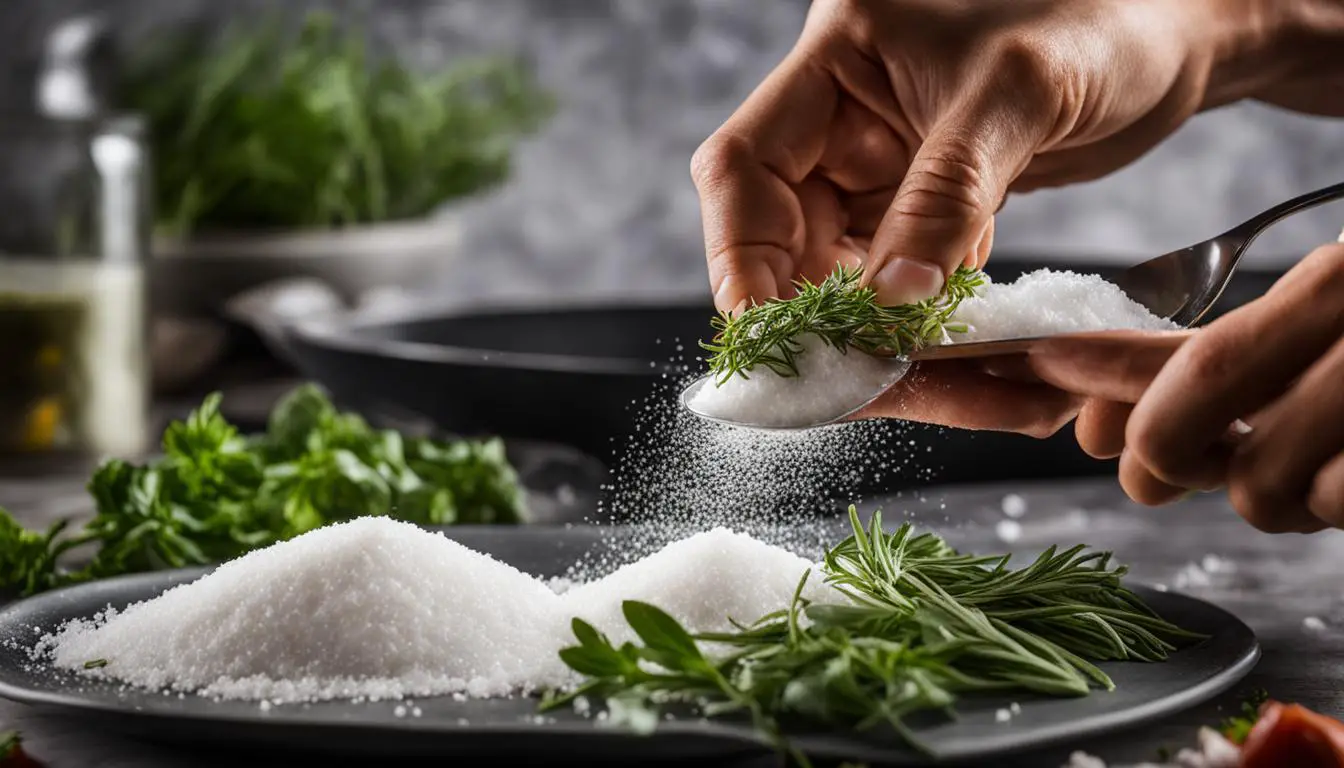Originally posted on December 13, 2023 @ 9:25 pm
When browsing through recipes, you may have come across the ingredient “kosher salt” and wondered why it’s called for specifically. What makes kosher salt different from regular table salt, and why is it commonly used in cooking? In this article, we’ll explore the benefits and role of kosher salt in recipes, helping you understand why it’s a staple in many kitchens.
Contents
- 1 What is Kosher Salt and Why is it Called That?
- 2 Kosher Salt vs. Regular Table Salt
- 3 The Role of Kosher Salt in Cooking
- 4 Benefits of Using Kosher Salt in Recipes
- 5 Kosher Salt in Baking
- 6 Other Types of Salt to Consider
- 7 Choosing the Right Kosher Salt Brand
- 8 Tips for Using Kosher Salt in Cooking
- 9 Conclusion
- 10 FAQ
- 10.1 Why do recipes call for kosher salt?
- 10.2 What are the benefits of using kosher salt in recipes?
- 10.3 What is the role of kosher salt in cooking?
- 10.4 What is the difference between kosher salt and regular table salt in recipes?
- 10.5 Why is kosher salt important in recipe preparation?
- 10.6 Can kosher salt be used in baking?
- 10.7 Are there other types of salt that can be used in cooking?
- 10.8 What are the differences between Morton Kosher Salt and Diamond Crystal Kosher Salt?
- 10.9 What are some tips for using kosher salt in cooking?
- 11 Source Links
Key Takeaways:
- Kosher salt is a standardized product, ensuring consistency in salinity and making it reliable for achieving the desired flavor in dishes.
- The larger flakes of kosher salt provide better control and make it less likely to oversalt a dish.
- Kosher salt has a purer flavor profile, as it does not contain additives like iodine or metallic compounds.
- The coarse texture of kosher salt allows for easy visual measurement, making it convenient for cooks.
- Using kosher salt in recipes enhances the flavor of dishes and contributes to an enjoyable cooking and dining experience.
What is Kosher Salt and Why is it Called That?
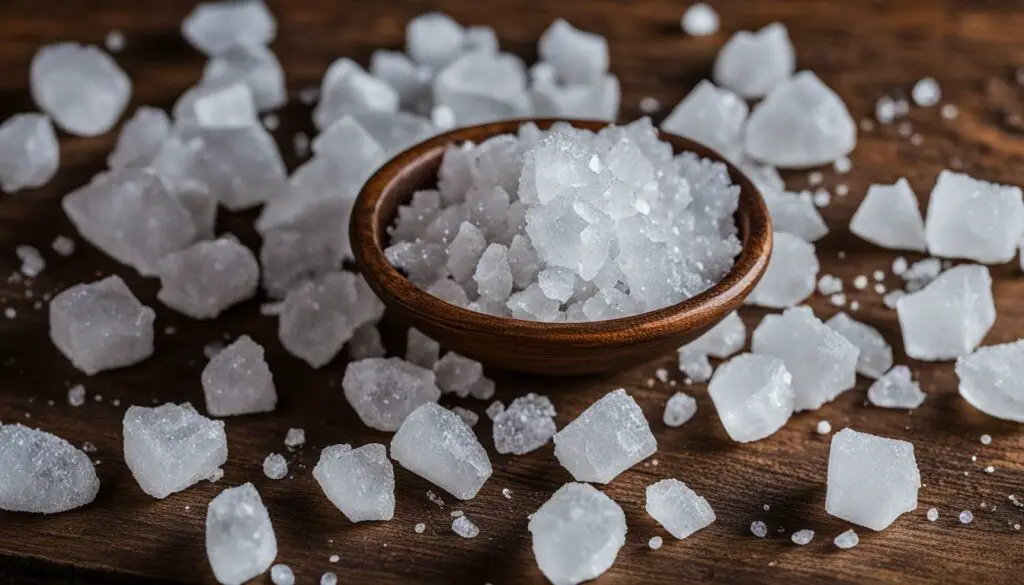
Despite its name, kosher salt is not specifically tied to Jewish culinary traditions. It was historically used for the process of koshering meat, where its larger grains helped draw out moisture from the meat. Kosher salt is technically a type of sea salt and is available in various brands. The name “kosher” simply refers to its effectiveness in koshering meat and has no direct association with religious practices.
When it comes to understanding what kosher salt is, its definition extends beyond its name. Kosher salt is a type of coarse salt that is used in the culinary world for its unique qualities and ability to enhance flavors in various dishes. While its name may suggest a connection to Jewish cuisine, kosher salt is widely used by professional chefs and home cooks alike, regardless of their cultural or religious background.
Originating from the need to remove blood from meat during the koshering process, kosher salt gained popularity due to its effectiveness in drawing out moisture from the meat. Its larger grains allowed for better absorption, leading to more flavorful and tender results. Over time, kosher salt found its way into general culinary practices, becoming a staple in many kitchens worldwide.
Kosher Salt vs. Regular Table Salt
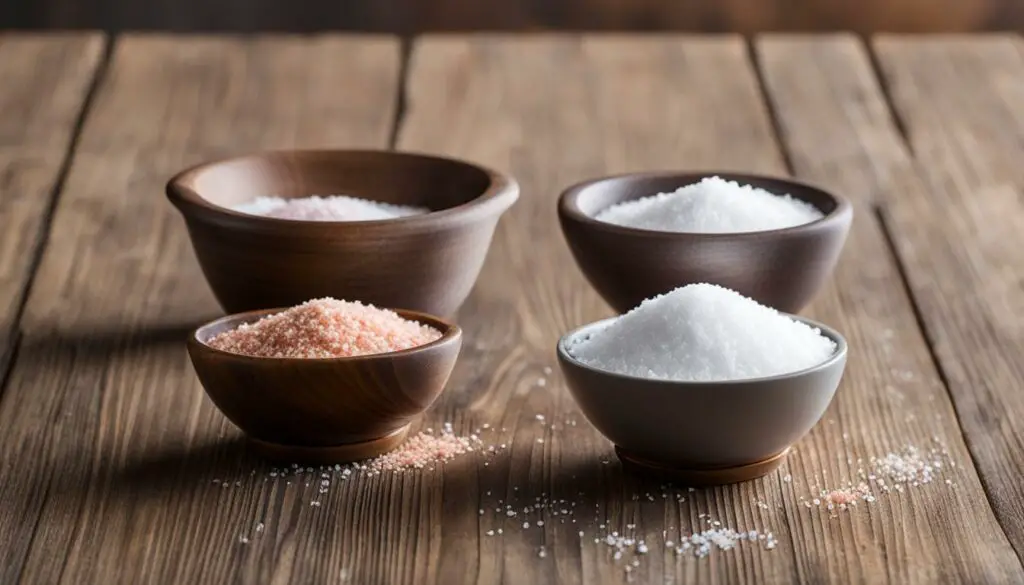
When it comes to selecting salt for your recipes, you may find yourself wondering about the difference between kosher salt and regular table salt. While both can be used in cooking, they have distinct characteristics that affect the taste and overall outcome of your dishes.
Kosher salt has larger and coarser grains compared to the fine texture of table salt. This difference in texture plays a significant role in how each salt impacts the flavor of your food. The larger grains of kosher salt provide more control over salting, allowing you to enhance the taste without making the dish overly salty.
In addition to texture, another distinction between kosher salt and table salt is their composition. Table salt often contains iodine and other additives, which may give a bitter taste to your foods. On the other hand, kosher salt does not contain iodine or other metallic compounds, resulting in a purer flavor profile.
Ultimately, the choice between kosher salt and regular table salt depends on personal preference and the desired outcome in a recipe. If you prefer a salt with larger grains for better control and a purer flavor, kosher salt is an excellent option to consider. However, if you’re accustomed to the fine texture of table salt or prefer the slight iodine flavor, then table salt may be more suitable for your taste.
| Kosher Salt | Regular Table Salt |
|---|---|
| Larger and coarser grains | Finer texture |
| Enhances flavor without oversalting | Saltiness can be easily overdone |
| No iodine or additives | May contain iodine and additives |
| Purer flavor profile | Possible bitterness from additives |
| Ideal for visual measurement | May require adjustments due to finer texture |
The Role of Kosher Salt in Cooking

Kosher salt plays a vital role in culinary creations as it enhances the flavor of dishes. Its distinctive characteristics make it a popular choice for seasoning in recipes and for adding a finishing touch at the table.
One of the primary reasons for using kosher salt in cooking is its larger and coarser texture. The size of the salt flakes makes it easier to control the amount of salt being added to a dish. This is especially important when seasoning during cooking, as it allows for more precise measurements, preventing the risk of oversalting.
The visual aspect of kosher salt is another advantage. The larger grains make it more visible, enabling chefs and home cooks to see and gauge the amount of salt they are adding. This visual cue helps maintain the desired balance of flavors in a dish.
Moreover, kosher salt is renowned for its purity. It contains no additives like iodine or metallic compounds found in regular table salt. As a result, kosher salt imparts a clean and purer saltiness to food, enhancing the overall taste of the dish.
Overall, the purpose of using kosher salt in cooking is to elevate the flavors of various ingredients and bring out the best in every culinary creation. Its unique texture, visual appeal, and pure saltiness make it a valuable seasoning ingredient for both professional chefs and home cooks alike.
Benefits of Using Kosher Salt in Recipes
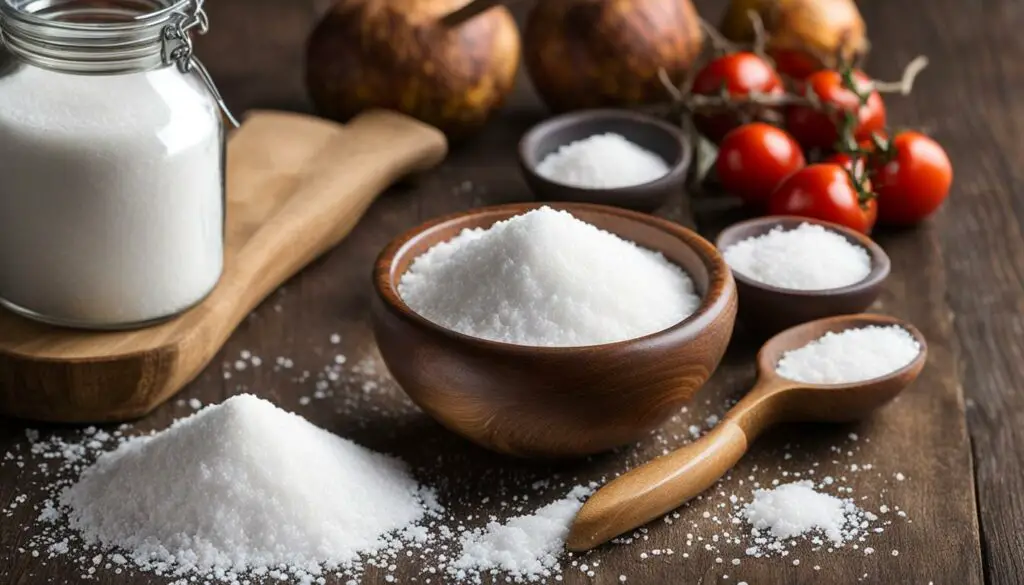
The use of kosher salt in recipes offers numerous benefits that can enhance the flavor and overall dining experience. Let’s explore some of the key advantages of incorporating kosher salt into your cooking:
Better Control Over Seasoning
Kosher salt’s larger flakes make it harder to oversalt a dish, providing cooks with better control over the seasoning. The coarse texture allows for a more gradual release of salt, preventing a heavy-handed approach that can overpower the other flavors in the recipe.
Purer Flavor Profile
Unlike table salt, kosher salt does not contain additives like iodine or other metallic compounds. This absence of additives ensures a purer flavor profile, allowing the natural taste of the ingredients to shine through. It helps avoid any undesirable bitter aftertaste that may result from using table salt.
Easy Measurement and Consistent Seasoning
One of the distinct advantages of kosher salt is its visual nature, which allows for easy measurement and consistent seasoning throughout the cooking process. The larger size and texture of kosher salt crystals make it clear to see and handle, reducing the likelihood of under or oversalting. This visual aspect makes it a preferred choice for chefs and home cooks alike.
Enhanced Flavor in Recipes
By using kosher salt in recipes, you can elevate the overall taste of your dishes. The salt’s larger particles enhance the flavor of different ingredients, allowing them to stand out and create a more well-rounded culinary experience. This flavor enhancement can make a significant difference in the final outcome of your recipes.
Kosher Salt in Baking

Kosher salt can also be used in baking, offering versatility and convenience for bakers. While there may not be significant scientific advantages over regular salt, some bakers prefer kosher salt for its larger crystals. These larger crystals make it easy to distinguish from granulated sugar, preventing any confusion during the baking process.
When it comes to taste and functionality, there are no major differences between kosher salt and regular salt in most baking applications. Both types of salt dissolve easily, providing the same basic role of enhancing flavors in baked goods. The choice between kosher salt and regular salt in baking ultimately depends on personal preference and the desired outcome in a specific recipe.
Other Types of Salt to Consider

In addition to kosher salt and regular table salt, there are other types of salt that can add unique flavors and textures to your culinary creations. One such salt is sea salt, which is harvested from the ocean and may contain micro nutrients and subtle flavors that are not present in kosher salt. Sea salt can enhance the taste of various dishes and is particularly favored for its natural briny essence.
Another interesting option is flaky sea salt, characterized by its large and crunchy crystals. Flaky sea salt is often used as a finishing salt, sprinkled over dishes just before serving to bring out their flavors and add an enjoyable texture. It can elevate everything from roasted vegetables to chocolate desserts, providing a delightful burst of saltiness.
However, when it comes to consistency and precise measurements in recipes, kosher salt is generally recommended. It has a standardized texture and salinity, ensuring predictable results in your cooking endeavors.
Choosing the Right Kosher Salt Brand
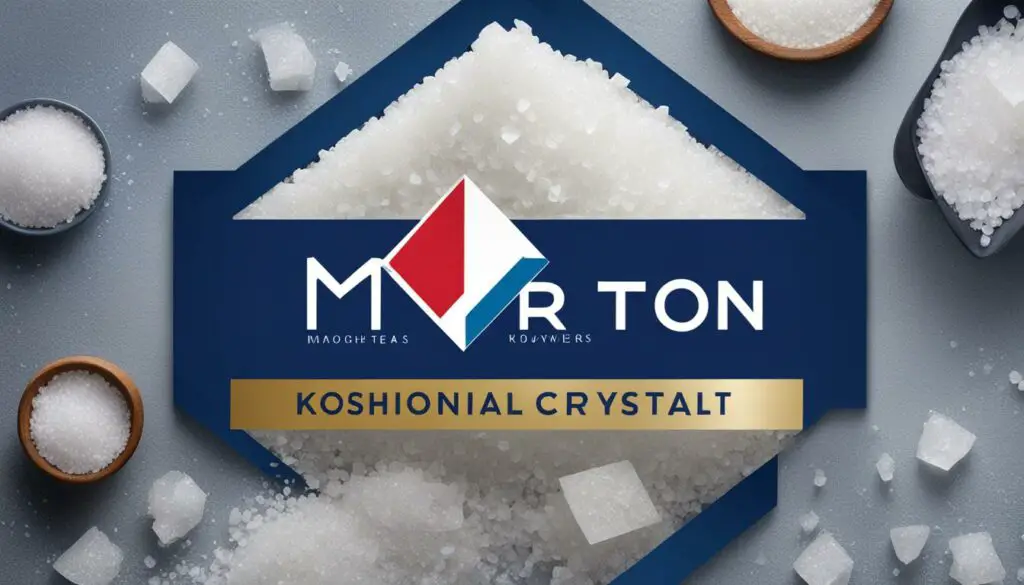
When it comes to selecting the perfect kosher salt for your recipes, considering the brand is crucial. Two popular options in the market are Morton Kosher Salt and Diamond Crystal Kosher Salt. While both brands offer high-quality kosher salt, they do have some subtle differences in terms of salinity.
Morton Kosher Salt, known for its superior quality and reliability, tends to be slightly saltier compared to Diamond Crystal Kosher Salt. This difference in salinity can impact the overall taste of your dish. Therefore, if you’re substituting one brand with another in a recipe, it’s important to make adjustments accordingly to maintain the desired flavor balance.
To ensure consistency in flavor and achieve the desired results, it is recommended to stick with your preferred brand of kosher salt throughout your culinary endeavors. By using the same brand consistently, you will become familiar with its salinity levels, enabling you to season your dishes with precision and confidence.
Tips for Using Kosher Salt in Cooking
When it comes to cooking with kosher salt, a few tips can help you achieve optimal results. From choosing the right container to understanding its flavor-enhancing potential, here are some useful tips:
1. Select the Right Container
Due to its larger grains, kosher salt is not suitable for salt shakers or grinders designed for finer salts like table salt. Instead, keep your kosher salt in a salt cellar or container with a wide opening for easy access and sprinkling.
2. Start with a Lesser Amount
When salting food to taste, it’s always a good idea to start with a lesser amount of kosher salt and gradually adjust as needed. Remember, you can always add more salt, but it’s challenging to remove excess salt if you oversalt your dish.
3. Combine with Other Ingredients
Kosher salt has a unique ability to enhance the flavors of other ingredients. Experiment with combining kosher salt with herbs, spices, or citrus to create vibrant and well-balanced flavors in your dishes.
4. Practice Visual Measurement
One advantage of kosher salt’s larger and coarser texture is its visual measurement. Get used to visually estimating the amount of kosher salt added to your dishes, ensuring consistent seasoning throughout the cooking process.
5. Consider the Dish’s Cooking Time
Keep in mind that kosher salt needs time to dissolve and flavor the dish. When cooking or marinating for longer periods, it’s important to add the kosher salt earlier, allowing it to infuse into the ingredients and bring out their natural flavors.
6. Taste and Adjust
Seasoning is a matter of personal preference. Taste your dishes while cooking and adjust the amount of kosher salt accordingly. Remember, cooking is an art, and exploring your taste preferences will lead to customized and delightful culinary creations.
| Tips for Using Kosher Salt in Cooking |
|---|
| Select the Right Container |
| Start with a Lesser Amount |
| Combine with Other Ingredients |
| Practice Visual Measurement |
| Consider the Dish’s Cooking Time |
| Taste and Adjust |
Conclusion
In conclusion, kosher salt is a versatile and commonly used ingredient in recipes that offers numerous benefits. Its larger flakes provide better control over seasoning, allowing for more precise flavor adjustments. The absence of additives in kosher salt ensures a purer taste, without any bitter notes that can be found in regular table salt. Additionally, the visual aspect of kosher salt makes it easy to measure and adds convenience to the cooking process.
Kosher salt’s unique properties make it a preferred choice for many cooks. Whether you’re a professional chef or a home cook, using kosher salt in recipes can greatly enhance the flavor profile of dishes. Its ability to bring out the natural flavors of ingredients and provide a consistent level of saltiness makes it an essential ingredient in any kitchen.
So why not start experimenting with kosher salt in your recipes? By incorporating kosher salt into your cooking, you’ll discover its impact on flavor and enjoy a more enjoyable culinary experience. Whether you’re seasoning a roast, boiling pasta, or simply adding a pinch of salt to your favorite dish, kosher salt is a reliable and flavorful option that can elevate your cooking to new heights.
FAQ
Why do recipes call for kosher salt?
Recipes call for kosher salt because it is a standardized product that is consistent in salinity, making it reliable for achieving the desired flavor in dishes.
What are the benefits of using kosher salt in recipes?
Using kosher salt in recipes offers several benefits, including better control over seasoning, a purer flavor profile, and easy visual measurement.
What is the role of kosher salt in cooking?
Kosher salt is used for seasoning and enhancing the flavor of dishes during cooking or at the table. Its larger and coarser texture makes it ideal for this purpose.
What is the difference between kosher salt and regular table salt in recipes?
Kosher salt has larger and coarser grains compared to the fine texture of table salt. This difference provides more control over seasoning and avoids a bitter taste often associated with table salt.
Why is kosher salt important in recipe preparation?
Kosher salt is important in recipe preparation because it enhances the flavor of dishes and allows for better control and measurement of seasoning.
Can kosher salt be used in baking?
Yes, kosher salt can be used in baking, although there are no major differences in taste or functionality compared to regular salt. Some bakers prefer kosher salt for its larger crystals, which make it easy to distinguish from sugar.
Are there other types of salt that can be used in cooking?
Yes, apart from kosher salt and table salt, sea salt is another popular option. Flaky sea salt, with its large crystals, is often used as a finishing salt to add texture and flavor to dishes.
What are the differences between Morton Kosher Salt and Diamond Crystal Kosher Salt?
Morton Kosher Salt is slightly saltier than Diamond Crystal Kosher Salt, so adjustments may need to be made when substituting one for the other in a recipe. It is recommended to stick with your preferred brand for consistency.
What are some tips for using kosher salt in cooking?
When using kosher salt, avoid using it in salt shakers or grinders designed for finer salts. Start with a lesser amount and gradually adjust to avoid oversalting. Experiment with combining kosher salt with other ingredients for enhanced flavors.

